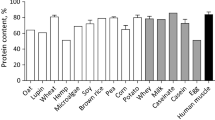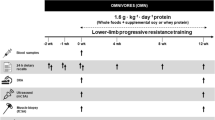Abstract
High-protein diets have been shown to alleviate detrimental effects of high-fat diets and this effect can be partially mimicked by dietary l-leucine supplementation. Here, we aimed to elucidate the early mechanisms and the specificity of leucine effects. We performed a 1-week trial with male C57BL/6 mice fed ad libitum with semisynthetic high-fat diets containing an adequate (10 % w/w, AP) or high (50 % w/w, HP) amount of whey protein, or supplemented with l-leucine corresponding to the leucine content within the HP diet (Leu) or supplemented with equimolar l-alanine (Ala). Food and water intake were monitored continuously using a computer-controlled monitor system and body composition changes were assessed using quantitative NMR. HP completely prevented the AP-induced accumulation of body fat. Leu and Ala resulted in a similar reduction of body fat accumulation which was intermediate between AP and HP. There were no significant effects on plasma glucose or insulin. Triacylglycerol content and gene expression of lipogenesis enzymes in liver as well as plasma cholesterol were reduced by HP compared to AP with Leu and Ala again showing intermediate effects. Body fat gain and liver triacylglycerols were strongly correlated with total energy intake. Water intake was rapidly increased by HP feeding and total water intake correlated strongly with total amino nitrogen intake. We concluded that the positive effects of high-protein diets on metabolic syndrome associated traits are acutely due to effects on satiety possibly linked to amino nitrogen intake and on the subsequent suppression of liver lipogenesis without evidence for a specific leucine effect.


Similar content being viewed by others
References
Adams SH (2011) Emerging perspectives on essential amino acid metabolism in obesity and the insulin-resistant state. Adv Nutr 2(6):445–456
Ahmadian M, Wang Y, Sul HS (2010) Lipolysis in adipocytes. Int J Biochem Cell Biol 42(5):555–559
Arakawa M, Masaki T, Nishimura J, Seike M, Yoshimatsu H (2011) The effects of branched-chain amino acid granules on the accumulation of tissue triglycerides and uncoupling proteins in diet-induced obese mice. Endocr J 58(3):161–170
Bankir L, Bouby N, Trinh-Trang-Tan MM, Ahloulay M, Promeneur D (1996) Direct and indirect cost of urea excretion. Kidney Int 49(6):1598–1607
Cota D (2009) Mammalian target of rapamycin complex 1 (mTORC1) signaling in energy balance and obesity. Physiol Behav 97(5):520–524
Cota D, Proulx K, Smith KA, Kozma SC, Thomas G, Woods SC, Seeley RJ (2006) Hypothalamic mTOR signaling regulates food intake. Science 312(5775):927–930
Davy BM, Dennis EA, Dengo AL, Wilson KL, Davy KP (2008) Water consumption reduces energy intake at a breakfast meal in obese older adults. J Am Diet Assoc 108(7):1236–1239
Dennis EA, Flack KD, Davy BM (2009) Beverage consumption and adult weight management: a review. Eat Behav 10(4):237–246
Drummond MJ, Rasmussen BB (2008) Leucine-enriched nutrients and the regulation of mammalian target of rapamycin signalling and human skeletal muscle protein synthesis. Curr Opin Clin Nutr Metab Care 11(3):222–226
Felig P (1973) The glucose-alanine cycle. Metabolism 22(2):179–207
Forslund AH, Hambraeus L, Olsson RM, El-Khoury AE, Yu YM, Young VR (1998) The 24-h whole body leucine and urea kinetics at normal and high protein intakes with exercise in healthy adults. Am J Physiol 275(2 Pt 1):E310–E320
Freudenberg A, Petzke KJ, Klaus S (2012) Comparison of high-protein diets and leucine supplementation on metabolic syndrome and related disorders in mice. J Nutr Biochem. doi:10.1016/j.jnutbio.2011.10.005
Guo K, Yu YH, Hou J, Zhang Y (2010) Chronic leucine supplementation improves glycemic control in etiologically distinct mouse models of obesity and diabetes mellitus. Nutr Metab (Lond) 7:57
Halton TL, Hu FB (2004) The effects of high protein diets on thermogenesis, satiety and weight loss: a critical review. J Am Coll Nutr 23(5):373–385
Hochstenbach-Waelen A, Veldhorst MA, Nieuwenhuizen AG, Westerterp-Plantenga MS, Westerterp KR (2009) Comparison of 2 diets with either 25 % or 10 % of energy as casein on energy expenditure, substrate balance, and appetite profile. Am J Clin Nutr 89(3):831–838
Holecek M, Kovarik M (2011) Alterations in protein metabolism and amino acid concentrations in rats fed by a high-protein (casein-enriched) diet—effect of starvation. Food Chem Toxicol 49(12):3336–3342
Jackson AA (1998) Salvage of urea-nitrogen in the large bowel: functional significance in metabolic control and adaptation. Biochem Soc Trans 26(2):231–236
Jean C, Rome S, Mathé V, Huneau JF, Aatouri N, Fromentin G, Achagiotis CL, Tomé D (2001) Metabolic evidence for adaptation to a high protein diet in rats. J Nutr 131(1):91–98
Katterle Y, Keipert S, Hof J, Klaus S (2008) Dissociation of obesity and insulin resistance in transgenic mice with skeletal muscle expression of uncoupling protein 1. Physiol Genomics 32(3):352–359
Klaus S (2005) Increasing the protein:carbohydrate ratio in a high-fat diet delays the development of adiposity and improves glucose homeostasis in mice. J Nutr 135(8):1854–1858
Klaus S, Rudolph B, Dohrmann C, Wehr R (2005) Expression of uncoupling protein 1 in skeletal muscle decreases muscle energy efficiency and affects thermoregulation and substrate oxidation. Physiol Genomics 21(2):193–200
Macotela Y, Emanuelli B, Bang AM, Espinoza DO, Boucher J et al (2011) Dietary leucine—an environmental modifier of insulin resistance acting on multiple levels of metabolism. PLoS One 6(6):e21187
Murgas Torrazza R, Suryawan A, Gazzaneo MC, Orellana RA, Frank JW, Nguyen HV, Fiorotto ML, El-Kadi S, Davis TA (2010) Leucine supplementation of a low-protein meal increases skeletal muscle and visceral tissue protein synthesis in neonatal pigs by stimulating mTOR-dependent translation initiation. J Nutr 140(12):2145–2152
Nair KS, Halliday D, Garrow JS (1983) Thermic response to isoenergetic protein, carbohydrate or fat meals in lean and obese subjects. Clin Sci (Lond) 65(3):307–312
Noatsch A, Petzke KJ, Millrose MK, Klaus S (2011) Body weight and energy homeostasis was not affected in C57BL/6 mice fed high whey protein or leucine-supplemented low-fat diets. Eur J Nutr 50(6):479–488
Petzke KJ, Elsner A, Proll J, Thielecke F, Metges CC (2000) Long-term high protein intake does not increase oxidative stress in rats. J Nutr 130(12):2889–2896
Petzke KJ, Schuppe S, Rohn S, Rawel HM, Kroll J (2005) Chlorogenic acid moderately decreases the quality of whey proteins in rats. J Agric Food Chem 53(9):3714–3720
Petzke KJ, Freudenberg A, Klaus S (2012) Dietary leucine and alanine supplementation have similar effects in the prevention of high fat diet induced obesity. FASEB J 26(820):7
Pfeiffer A, Henkel H, Verstegen MWA, Philipczyk I (1995) The influence of protein intake on water balance, flow rate and apparent digestibility of nutrients at the distal ileum in growing pigs. Livestock Prod Sci 44(2):179–187
Popkin BM, Armstrong LE, Bray GM, Caballero B, Frei B, Willett WC (2006) A new proposed guidance system for beverage consumption in the United States. Am J Clin Nutr 83(3):529–542
Potier M, Darcel N, Tomé D (2009) Protein, amino acids and the control of food intake. Curr Opin Clin Nutr Metab Care 12(1):54–58
Rémésy C, Demigné C, Aufrère J (1978) Inter-organ relationships between glucose, lactate and amino acids in rats fed on high-carbohydrate or high-protein diets. Biochem J 170(2):321–329
Seney F, Persson EG, Wright FS (1987) Modification of tubuloglomerular feedback signal by dietary protein. Am J Physiol 252(1 Pt 2):F83–F90
Stookey JD, Constant F, Popkin BM, Gardner CD (2008) Drinking water is associated with weight loss in overweight dieting women independent of diet and activity. Obesity (Silver Spring) 16(11):2481–2488
Surwit RS, Feinglos MN, Rodin J, Sutherland A, Petro AE, Opara EC, Kuhn CM, Rebuffe-Scrive M (1995) Differential effects of fat and sucrose on the development of obesity and diabetes in C57BL/6 and A/J mice. Metabolism 44(5):645–651
Suryawan A, Orellana RA, Fiorotto ML, Davis TA (2011) Triennial growth symposium: leucine acts as a nutrient signal to stimulate protein synthesis in neonatal pigs. J Anim Sci 89(7):2004–2016
Westerterp-Plantenga MS, Nieuwenhuizen A, Tomé D, Soenen S, Westerterp KR (2009) Dietary protein, weight loss, and weight maintenance. Annu Rev Nutr 29:21–41
Wilson FA, Suryawan A, Orellana RA, Gazzaneo MC, Nguyen HV, Davis TA (2011) Differential effects of long-term leucine infusion on tissue protein synthesis in neonatal pigs. Amino Acids 40(1):157–165
Wu G (2009) Amino acids: metabolism, functions, and nutrition. Amino Acids 37(1):1–17
Young VR, El-Khoury AE, Raguso CA, Forslund AH, Hambraeus L (2000) Rates of urea production and hydrolysis and leucine oxidation change linearly over widely varying protein intakes in healthy adults. J Nutr 130(4):761–766
Zhang Y, Guo K, LeBlanc RE, Loh D, Schwartz GJ, Yu YH (2007) Increasing dietary leucine intake reduces diet-induced obesity and improves glucose and cholesterol metabolism in mice via multimechanisms. Diabetes 56(6):1647–1654
Zhou J, Keenan MJ, Losso JN, Raggio AM, Shen L, Mc Cutcheon KL, Tulley RT, Blackman MR, Martin RJ (2011) Dietary whey protein decreases food intake and body fat in rats. Obesity (Silver Spring) 19(8):1568–1573
Acknowledgments
Anja Schueler is gratefully acknowledged for excellent technical assistance. S.K. and K.J.P. designed research, A.F. performed the experiments and analysed the data, and the manuscript was written by A.F., K.J.P., and S.K. The authors declare no conflict of interest. This study was supported by the Deutsche Forschungsgemeinschaft, Bonn, Germany (contract/Grant Number: PE 643/7-1). The funders had no role in study design, data collection and analysis, decision to publish or preparation of the manuscript.
Author information
Authors and Affiliations
Corresponding author
Electronic supplementary material
Below is the link to the electronic supplementary material.
Rights and permissions
About this article
Cite this article
Freudenberg, A., Petzke, K.J. & Klaus, S. Dietary l-leucine and l-alanine supplementation have similar acute effects in the prevention of high-fat diet-induced obesity. Amino Acids 44, 519–528 (2013). https://doi.org/10.1007/s00726-012-1363-2
Received:
Accepted:
Published:
Issue Date:
DOI: https://doi.org/10.1007/s00726-012-1363-2




